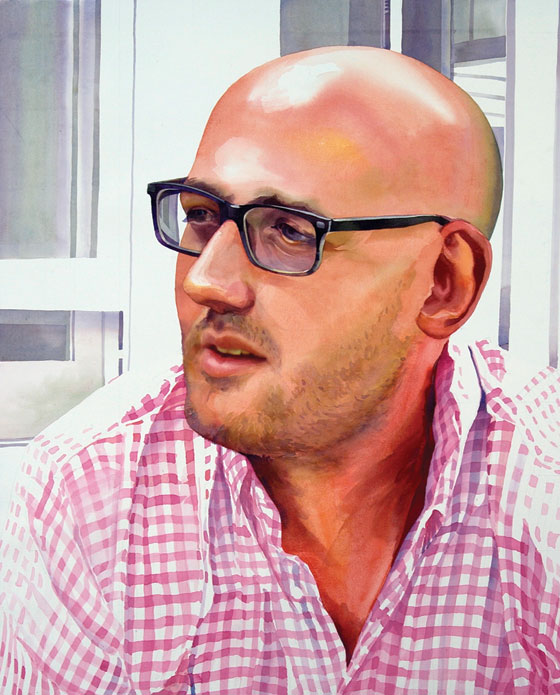
You probably think of the author Ben Marcus—if you think of him at all—as a deliberately obscure novelist who likes to fling Molotov cocktails at the literary Establishment. Perhaps you’ve read his disjointed first novel, Notable American Women, about a behavioral-therapy cult in an alternate-universe Ohio, or even his truly abstruse collection of “stories,” The Age of Wire and String. Or maybe you put them down for something easier, in which case you know him only as that guy who tore Jonathan Franzen a new one in a 2005 essay in Harper’s: “Why Experimental Fiction Threatens to Destroy Publishing, Jonathan Franzen, and Life As We Know It: A Correction.” “It’s not politic to suggest that the brain is even involved in reading,” he lamented then, defending dense fiction against crowd-pleasers like Franzen, for whom “language is meant to flow predigested, like liquid down a feeding tube.” You’d be forgiven for coming away with the idea that Marcus equated difficult writing with ambition—and readability with selling out.
Prepare, as the postmodernists might put it, to interrogate your assumptions. Marcus’s new novel, The Flame Alphabet, in which the words of children become lethal to adults, shares many of the tropes that helped brand him as a “difficult” writer—language as poison, absurdist family violence, a Cronenbergian fusion of the mechanical and the grotesque. But for of all its dystopian inventions, the novel is fully intelligible and, for the first time, fully human. To Marcus’s hard-core fans, its narrative coherence and heart-on-sleeve sentiment might come as a shock. But to anyone lucky enough to hold a recent-vintage fiction M.F.A. degree from Columbia University, it looks more like a formidably talented writing teacher finally practicing what he preaches.
“You’re an idiot if you’re not gonna read everything you can get your hands on,” Marcus says, seated behind a bare desk in the closing days of the fall semester. Students used to sign up for his classes because they wanted to write something transgressive. Now they come because they know that he’s mentored acclaimed wunderkinder Rivka Galchen, Wells Tower, and Karen Russell and that as the former creative-writing chair he’s largely responsible for making Columbia one of the best writing programs in the country. It’s certainly the most vital, having synthesized the distinctive styles of its two major ancestors: the Iowa Writers’ Workshop, which spawned American realism and the M.F.A. culture that enshrined it, and the Brown program, which declared war on Iowa, cultivating postmodern tricks and a certain bad-boy bomb thrower named Ben Marcus.
But a funny thing happened on the way to metafiction: Marcus grew tired of Brown’s anything-goes ethos. “I learned a lot, but in the actual classroom I wasn’t getting Torah-level critiques of what I was doing,” he says. “When I started to teach, I really did feel that I owed it to my students to see if you can help someone be better.”
And he has, urging students to split the difference between reader-friendliness and high-art ambition—and to test their own inclinations. (To help lure them, Marcus brought on a broad range of brand-name teachers: Sam Lipsyte, Gary Shteyngart, Stacey D’Erasmo.) One popular Marcus seminar, “Technologies of Heartbreak,” explores writing as a “delivery system” for feeling, a soft machine whose effects are measured in hard-won units of emotion. It’s about using the brain, in a variety of ways, to get to the heart.
The Flame Alphabet is a well-oiled heartbreak machine, with a laser focus on what Marcus calls “the power of family to both love and destroy you.” And it was written much faster than the other books. “Every day I would mark where I stopped, and I would just pick up without rereading,” he says. “I was interested in what would happen if the story had momentum.” Narrated by a “Forest Jew” whose family has been torn apart by “the language toxin” and who then struggles to find a new language and a way back home, the story does the once unthinkable: meet the reader halfway. “Sometimes I can start to use strangeness as a crutch,” he admits. And now? “It actually seems the strangest thing to not be strange.”
The Flame Alphabet
By Ben Marcus.
Knopf, $25.95.
